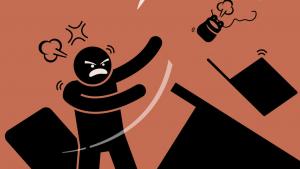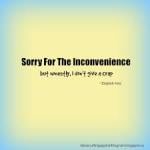As we have been selecting the required texts over the past couple of weeks for our colloquium on “Faith and Doubt” next semester, my teaching partner (a Dominican priest) and I were both inclined to think outside the box. My most inspired suggestion (I have one of those no more than once per month) was that we should kick the semester off with something from Anne Lamott. The best thing anyone has ever said about my writing is that it reminds them of Anne Lamott’s work. I wish and hope. Her work blew into my life fifteen or so years ago, and she is one of my few faith heroes. Insightful, hilarious, irreverent, full of doubt and, most importantly, full of love and hope.
I suggested her Plan B: Further Thoughts on Faith because it contains my two favorite one-liners from her many books. “Laughter is carbonated holiness,” and the insight that is the unofficial tagline of our new course: “The opposite of faith is not doubt, but certainty. Certainty is missing the point altogether.” Plan B is both brutally honest and hilarious, drawing attention to the strangeness, the beauty, and the difficulty of simply trying to be a functioning human being in a world that doesn’t make it easy. Lamott engages with her faith in real time on almost every page, trying it on for size in situations where it doesn’t seem to fit. As I reread the book over the past couple of weeks, I found it remarkably relevant to our world that, surprisingly, is not that different than the one that she struggled with in the early 2000s
A week or so ago, as we were driving to the ferry that would take us to Long Island for a wedding the next day, Jeanne and I tuned into the Sirius XM MSNBC station for the first time in a few weeks. The topic of conversation on Nicolle Wallace’s ”Deadline White House” show was how to organize resistance to the restrictive anti-abortion bill that was passed several weeks ago in Texas. Wallace asked her guest whether this law had moved the abortion issue to the top of people’s agenda of importance along with voting rights, infrastructure, anti-vaxxers, and hating Donald Trump. Her guest responded that “People are tired. It’s becoming more and more difficult to maintain an appropriate level of outrage.”
Ain’t that the truth. Just about everyone I know is suffering from a severe case of “outrage fatigue.” I’m reminded of something that a character in Ali Smith’s post-Brexit novel Autumn says.
I’m tired of the news. I’m tired of the way it makes things spectacular that aren’t, and deals so simplistically with what’s truly appalling. I’m tired of the vitriol. I’m tired of the anger. I’m tired of the meanness. I’m tired of the selfishness. I’m tired of how we’re doing nothing to stop it. I’m tired of how we’re encouraging it. I’m tired of the violence there is and I’m tired of the violence that’s on its way, that’s coming, that hasn’t happened yet.
I’m tired of liars. I’m tired of sanctified liars. I’m tired of how those liars have let this happen. I’m tired of having to wonder whether they did it out of stupidity or did it on purpose. I’m tired of lying governments. I’m tired of people not caring whether they’re being lied to any more. I’m tired of being made to feel this fearful. I’m tired of animosity.
I was feeling the same weariness and malaise a couple of weeks ago when someone tweeted “Who else thinks that firing healthcare workers who refuse to get the vaccine is the right thing to do?” I responded “Why do people spend so much energy trying to figure out who should be hated, rejected, fired, and so on? Negative energy hurts you a lot more than whomever you are directing it toward.” I suspect I’m not the only who knows this to be true, but it sure is difficult these days to avoid having your first thought in the morning be “What I’m I supposed to be outraged about today?”
Anne Lamott’s Plan B was published fifteen years ago, but the anger and outrage she struggles with throughout the book is a constant reminder that there are always things to be pissed off about and appalled by. Written during the early years of our post-9/11 war adventures in Iraq and Afghanistan, Lamott confesses that she hates George W. Bush, Dick Cheney, and everyone else responsible for what she believes to be a continuing, useless sacrifice of lives. “I am depressed and furious,” she writes. “I often feel like someone from the Book of Lamentations.” She’s an activist who marches and protests on occasion but is generally convinced that her actions have less effect than spitting into the wind. And she’s still outraged, telling her pastor that “I am so angry with and afraid of the right wing in this country that it is making me mentally ill.” What to do?
Many of us might recognize ourselves when Lamott admits that “Blame is always my first response: figure out whose fault things are, and then try to manipulate that person into correcting his or her behavior so that you can be more comfortable”—I know I do. She also knows that Christian posturing and platitudes not only are unhelpful, but often exacerbate the situation.
Christians have a very bad reputation in the world, and we have earned it, with our hate and self-righteousness. We speak in reverent terms of grace, justice, equality, mercy, and then we despise people who are also created in God’s image.
I learned a long time ago that if I was going to be serious about being a person of faith, that faith would just about always have to work itself out in ways that are frequently secret and silent, in incremental and subtle ways that seldom can be expressed in formulas or platitudes. It’s hard, and often is no fun. But as Anne Lamott reminds us, “It’s good to do uncomfortable things. It’s weight training for life.”
What, then, is to be done when an appropriate level of outrage can no longer be sustained? Here are a few suggestions from Plan B:
We start by being kind to ourselves. We breathe, we eat. We remember that God is present wherever people suffer. God’s here with us when we’re miserable, and God is there in Iraq.
What is there to do in such difficult, violent times? I try to follow my own advice to take short assignments and do shitty first drafts of my work, and most of all, to take things day by day.
With the war raging in Iraq, now was not the time to figure everything out—for instance who was to blame . . . It was time to be still, to center ourselves, to trust what we’d always trusted in: friendship, kindness, helping the poor, feeding the hungry.
Rest and laughter are the most spiritual and subversive acts of all. Laugh, rest, slow down . . . I would recommend that you all take a long deep breath and stop. Just be where your butts are and breathe. Take some time.
Most importantly, find reasons to hope. Hope isn’t something that happens to us; it’s something that we choose.
The reason I never give up hope is that everything is basically hopeless. Hopelessness underscores everything—the deep sadness and fear at the center of life, the holes in the heart of our families, the animal confusion within us . . . Hope is not about proving anything. It’s about choosing to believe this one thing, that love is bigger than any grim, bleak shit anyone can throw at us.
If you, as Anne Lamott, often feel these days as if you are living in the middle of the Book of Lamentations, remember that embedded in that very dark and depressing book is a remarkable promise.
I will call this to mind, as my reason to hope: The favors of the Lord are not exhausted, his mercies are not spent; They are renewed each morning, so great is his faithfulness. My portion is the Lord, therefore will I hope in him. Good is the Lord to one who waits for him, to the soul that seeks him; It is good to hope in silence for the saving help of the Lord.
Instead of trying to attain the appropriate level of outrage, let’s seek the appropriate level of hope and love.













